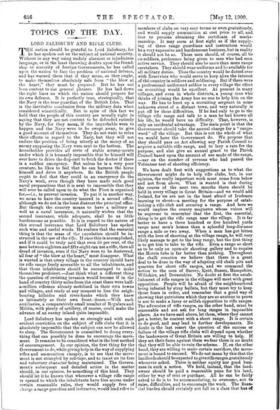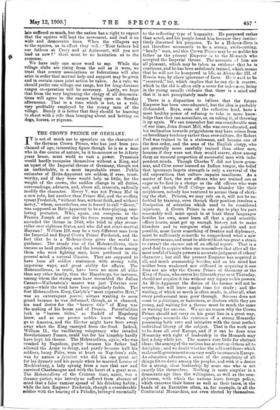TOPICS OF THE DAY.
LORD SALISBURY AND RIFLE CLUBS. THE nation should be grateful to Lord Salisbury, for he has spoken out on the subject of national security. Without in any way using unduly alarmist or injudicious language, or in the least throwing doubts upon the friend- ship or sincerity of foreign Governments, he has called upon the nation to ,face the problem of national defence, and has warned them that if they mean, as they ought, to make themselves absolutely safe from " the blow at the heart," they must be prepared. But he has not been content to use general phrases. He has laid down the right lines on which the nation should prepare for its own defence. It is perfectly true, strategically, that the Navy is the true guardian of the British Isles. That is the inevitable conclusion from the military data when considered scientifically. But in spite of this fact we hold that the people of this country are morally right in saying that they are not content to be defended entirely by the Navy, for they mean, if the improbable were to happen and the Navy were to be swept away, to give a good account of themselves. They do not want to relax their efforts in regard to the Navy, but they will not endure the position of being utterly at the mercy of an enemy supposing the Navy were sent to the bottom. The householder provides all sorts of stable arrangements under which it is humanly impossible that he himself will ever have to drive the dog-cart to fetch the doctor if there is a sudden emergency. But unless' he is a very poor creature, he likes to feel that he can harness the horse himself and drive it anywhere. So the British people ought to feel that they could in an emergency do the Navy's work, even though they have made such good naval preparations that it is next to impossible that they will ever be called upon to do what the Fleet is organised for,—i.e., to prevent invasion. To put it in another way, we mean to have the country insured in a second office, although we do not in the least distrust the principal office. But though the country means to have a military as well as a naval insurance, it naturally wishes that the second insurance, while adequate, shall be as little burdensome as possible. It is in regard to the nature of this second insurance that Lord Salisbury has spoken such wise and useful words. He realises that the essential thing is that the mass of the population should be in- structed in the use of the rifle. If once this is accomplished, and if it could be truly said that even 50 per cent. of the men between eighteen and fifty-eight can use a rifle, then all dread of invasion, even if the Navy were to be destroyed, all fear of " the blow at the heart," must disappear. What is wanted is that every village in the country should have its rifle range freely accessible to all the inhabitants, and that those inhabitants should be encouraged to make themselves proficient. —Just think what a different thing the question of resisting invasion would become if in the band of country thirty miles from the coast there were half- a-million riflemen already mobilised in their own towns and villages, and ready at any moment to line the neigh- bouring hillsides and river-banks which they knew as intimately as their own front-doors.—With such auxiliaries, a comparatively small number of Regulars and Militia, with plenty of artillery, of course, could make the advance of an enemy inland quite impossible.
Lord Salisbury has spoken so strongly and with such evident conviction on the subject of rifle clubs that it is absolutely impossible that the subject can now be allowed to sleep. The Government is committed to doing every- thing that can possibly be done to encourage the move- ment. It remains to be considered what is the best method of encouragement. In our opinion, the first thing for the Government to do, while giving help in the way of supplying rifles and ammunition cheaply, is to see that the move- ment is not strangled by red-tape, and to insist on its free and voluntary character being maintained. The Govern- ment's subsequent and detailed action in the matter should, in our opinion, be something of this kind. They should let it be known that whenever a village rifle range is opened to which the inhabitants have free access under certain reasonable rules, they would supply free of charge a range guardian and instructor, would lend rifles to members of clubs on very easy terms or even gratuitously, and would supply ammunition at cost price to all, and free to persons obtaining the certificate of marks- manship. It may seem at first sight as if the supply- ing of these range guardians and instructors would be a very expensive and burdensome business, but in reality it should not be so. These men should, of course, all be ex-soldiers, preference being given to men who had seen active service. They should also be wore than mere range caretakers. They should wear uniforms and be available for all military duties. Thus the country would be dotted over with Reservists who would serve to keep alive the interest of the country in soldiers and soldiering. But if there were a professional uniformed soldier in every village the effect on recruiting would be excellent. At present in many villages, and even in whole districts, a young man who thinks of joining the Army has no one to help him on the way. He has to hunt up a recruiting sergeant in some unknown street of a distant town, and very naturally is put off by these difficulties. If he had only to go to the village rifle range and talk to a man he had known all his life, he would have no difficulty. That, however, is only an incidental advantage. The main point is that the Government should take the annual charge for a " range- ward" off the village. But this is not the whole of what we would have the Government do. We propose that they should pass an Act allowing any Parish Council to acquire a suitable rifle range, and to levy a rate for the purpose, and also give an annual grant to the Parish Council based upon the amount of use made of the range, —say on the number of persons who had passed the Volunteer test of shooting efficiency.
We have dealt first with suggestions as to what the Government might do to help rifle clubs, but, in our opinion, the really important work must come from below and not from above. What is wanted is that during the course of the next two months there should be held in every village in Great Britain—and we would add Ireland, for we are not in the least afraid of Irishmen learning to shoot—a meeting for the purpose of estab- lishing a rifle club and securing a range. And here we would implore the county magnates whose voices will be supreme to remember that the first, the essential, thing is to get the rifle range near the village. It is far better to have a three hundred or five hundred yards range near men's homes than a splendid long-distance range a mile or two away. When a man has got bitten with the love of shooting at the village range, he will very likely manage to get to the long range, but the first thing is to get him to take to the rifle. Even, a range so short as to be only an open-air shooting gallery and to require the Morris tube is far better than nothing. Throughout the chalk counties we believe that there is a great deal to be done in the way of adapting old chalk pits and quarries for short rifle ranges, and we commend the notion" to the men of Surrey, gent, Sussex, Hampshire, Wiltshire, and Dorsetshire. No doubt at first the estab- lishment of rifle ranges in the villages will meet with great opposition. People will be afraid of the neighbourhood being infested by stray bullets, but they must try to keep those fears in order, and remember that a good way of showing that patriotism which they are so anxious to prove is not to make a fussy or selfish opposition to rifle ranges. The advocates of rifle ranges, on the other hand, mast be reasonable and not ask for long fines in impossible places. As we have said above, let them, where they cannot get a better, be content with a short range. It is certain to do good, and may lead to further developments. No doubt in the last resort the question of the success or failure of the village rifle clubs will depend upon whether the landowners of Great Britain are willing to help. If they set their faces against them we fear there is no doubt that they will be able to ruin the scheme. If, on the other hand, they are willing to make certain sacrifices, the move- ment is bound to succeed. We do not mean by this that the landlords should be expected to give rifleranges gratuitously whenever asked. There is neither equity nor good busi- ness in such a notion. We hold, instead, that the, land- owner should be paid a reasonable price for his land, A either by way of rent or purchase.All he can be fairly asked to do is to be accommodating, to overcome, not to raise, difficulties, and to encourage the work. The finan- cial burden should certainly not fall on a class that has of - late suffered so much, but the nation has a right to expect that the squires will lead the movement, and lead it on wide and democratic lines. When the villagers say to the squires, as in effect they will : Your fathers led our fathers at Crecy and at Agincourt, will you not lead us now ? ' there must be no hesitation as to the response.
We have only one more word to say. While the village clubs are rising from the soil as it were, we trust that county associations or federations will also arise in order that mutual help and support may be given and in certain cases joint action be taken. As a rule, we should prefer one village one range, but for long-distance ranges co-operation will be necessary. Lastly, we hope that from the very beginning the clergy of all denomina- tions will agree to the ranges being open on Sunday afternoons. That is a time which is not, as a rule, very profitably employed by the young men of the village. Surely it is better that they should be learning to shoot with a rifle than lounging about and betting on dogs, horses, or pigeons.







































 Previous page
Previous page